THE RUSSIAN INVASION OF UKRAINE:
TWO PHOTOGRAPHS TAKEN ON DAY 3, SEEN BY ME ON THE FIRST ANNIVERSARY
Photograph of a Russian soldier on the outskirts of Kharkhiv, February 26th 2022
Rotting inside his uniform — he would be
but his final lover, the snow,
has lain on him so intimately
he is possessed entire;
his face veiled;
his right arm flung out on frozen linen
in his last abandon.
His up-turned wrist, his naked palm — florid — mimic life
but his fingers have scooped deep in a font of snow
as though he’ll rise and bless himself, thumb a swift cross
on our foreheads, eyes, lips, hearts,
shudder, and stumble on.
He’ll not be rising.
In the corner of the frame some pre-fab storage units
hint that he died in the back lot of a retail park.
Ochre and khaki, his stricken tank, behind him
(he did not leap far)
is motionless and only metal now.
I see the stillness, and the snow, a stalled assault,
already a year ago.
From all of this I can’t wring any meaning.
ENVOI:
Second Photograph: Shifted Point of View
Further shamed:
newly framed,
he lies dead
by a road.
Slick tarmac
army track;
human sack
slung off-road.
The first photograph spoke of human fragility, and callousness, and pointless enterprise. Yet there was a tenderness present in the gentleness of the snow. The second photograph showed harshly how close the body was to passing military vehicles — utterly disposable. I had been working on a response, in Ulster-Scots, to the the famous ninth-century Irish-language poem ‘Int én bec…’, known as ‘The Blackbird of Belfast Lough’. This is in the ancient Irish metre ‘snámh súad’, which the late Ciaran Carson rendered as ‘poetic floating’. It is technically very challenging: eight three-syllable lines; a tight rhyme-scheme; the word that ends the fourth line must be re-presented as the last word of the eighth line, with shifted meaning. The form’s tautness reinforces its valedictory ‘punch’ and the poem-and-envoi form is appropriate to my ‘double-take’ on the original photograph.
Later I had something else to say about these photographs and their effect on me.
POSTSCRIPT
In winter, when I was very young, I’d find
the inside of my bedroom window slicked with ice, opaque’d.
I’d stand close up to scrutinise that alien terrain,
its glistening battlements and outposts,
not knowing that the tiny engine of my breath
was sapping it, until, with a sudden bloom,
the glass would clear and I’d be looking through
to the other side.
In the aftermath of snow the air is numb.
I’ve lived with these two photographs,
returning to re-see, reflect and, suddenly,
I’m looking at myself:
I, lying on the hard, wet ground;
I, framing, and shifting the vantage-point;
I, who shoot / am shot.
In the aftermath of snow the air is clear.
The photographer and I at once distinct
and consubstantial; the photographed
and I – yes, the same applies.
Then / now; there / here –
I have been, suddenly, let through.
Does this amount to meaning? I see
that nothing human is apart from me;
even the most discarded, most absurd.
In the aftermath of snow the air bristles, and breathes.
